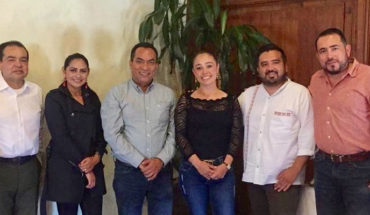If you are looking for a higher study at the tertiary or university level, this note is for you. A couple of young people couldn’t find something they loved to study and realized they lacked information about a lot of professions (something that happens to a lot of people). Thus Project in Career was born: a source of consultation counted in the first person by students or received from unconventional professions.
Marina Rabellino (20) and Sebastián Lepeiú (19) were schoolmates in Salto, Buenos Aires, and at the end of high school they had trouble finding something they were passionate about studying. Pretty common, isn’t it? Now Marina is pursuing a degree in Biology with orientation to Zoology at the National University of La Plata (UNLP) and Sebastian is studying for Performer in Musical Theater.The goal of Project in Career is to “bring information on higher studies, mainly unconventional, to those who want to continue their training”. He began taking shape in April this year with the help of a teacher who was able to guide them. “The first videos were from nearby people,” recalled the creators of the page that has information on geology, sacred sciences, football referee and tourism, among many others.
“We thought the best way to do it (and take advantage of the pandemic context) was through students or graduates passionate about what they do. In the first person they tell their experience and are available to those who want to know more,” Sebastian said of how it works and explained that what they are looking for is “clarifying what is often unclear in the curriculum or faculty pages”, as well as “showing more options than they generally present to us”. Over the past 10 years, the number of new enrollees, students and undergraduate and undergraduate graduates has increased. Between 2009 and 2018, there was 25.5% student growth (from 1,650,150 to 2,071,270). During the same period, there was an increase of 41.3% of new enrollees: from 387,603 in 2009 to 547,661 in 2018. In 2009 98,129 graduated, while in 2018 132,744 were completed, an increase of 35.3%. For more information on University Statistics Information Synthesis, click here.How does Project in Career work?
“In the first instance we summon acquaintances with careers that may become interested and on the other hand we open up the possibility for followers to tell us what they would like to see. That’s when we put our ‘Wanted’ section so others can know and invite those they know who are in that area,” Sebastian said, re-commenting, “The interesting thing is that the ball is running away and many come because they saw someone close to them participate or passed them the ‘Wanted’ flyer.”
While the focus is on unconventional careers (published on Instagram), they were asked for some traditional careers because of the enriching format they offer: “We opened a ‘Conventional’ sector on YouTube.” But that’s not all, they also organize activities such as Zoom meetings between the student who sent their video and those interested in that career who want to know more. “We uploaded a summary of that meeting to our social networks,” he clarified to make the material available to everyone.
Project in Career fans range from 15 to 30 years or so. The most consulted careers are Philosophy, Astronomy, Zoology, Kinesiology and Psychology. Some of the most “rare” are Logistics and Environmental Sciences. “With a single person asking about a career, we immediately set out to get them. It doesn’t matter that much but everyone leaves with something positive,” Sebastian said.
“Races of the future” can be considered unconventional as they are professions that over the years will become increasingly sought after. Some listed are those related to the environment (Environmental Sciences or Environmental Engineering). Engineering is always in high demand and especially those linked to technological advances such as Computer Engineering, Systems or Industrial.According to the Ministry of Education, the careers with the most registered in our country in 2018 were: Lawyers, Psychology, Business Administration, Nursing, Public Accountant, Systems and Computer Science. More than 40% choose Social and Legal Sciences, then come the Sciences of Health, Computer Science, Engineering and Architecture, Arts and Humanities and Economic Sciences.
Not all schools prepare young people to continue their studies and some people have the opportunity to study years later. The world changes and the wagonsuniversity and tertiary as well, so it is valuable to hear first-hand what a profession is all about, how it is studied in each institution and what job opportunities there are. So you know, if you want information about an unconventional race or consider that you can give information to others interested in your career, visit the profile.
In this note:





